The views expressed in our content reflect individual perspectives and do not represent the authoritative views of the Baha'i Faith.
Fog blotted out the stars on a rain-soaked night and nestled onto the forest floor throughout the eerie dawn. We lit a fire and bustled about making breakfast. Suddenly, a shift in the light drew our eyes toward the window, which framed half an acre of skyscraper-high cedars, pines, firs and madrones.
Almost bashfully, it seemed, the sun rose to the treetops and winked through their willowy limbs. The fog cloud dissipated, replaced by smoke from our chimney, which swirled down through the ancient grove in paisleys of silver steam. Sunbeams cast wondrous shadows of trunk and limb across the gauzy film while, in the corner of the window, the glass dimly mirrored the embers in our fireplace—orange flickers projected onto the haze. This wintry scene wrapped the Northern woodland with such magic that we simultaneously drew in a breath.
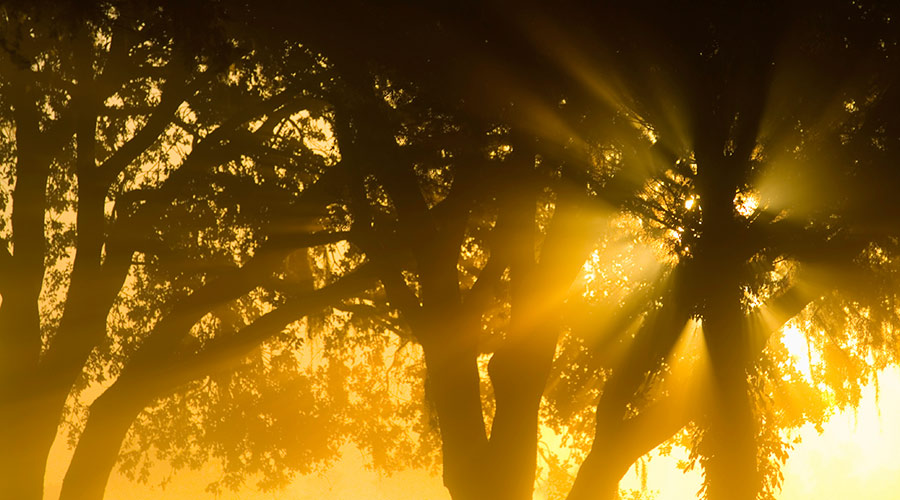
As I stared in wonderment, I saw so many metaphors in the layer of fog replaced by smoke, with a sun above and a fire superimposed on the haze below. The fog trembled like a shroud of hopelessness and doubt, leftover from the many religious conflicts raining down on heavy hearts—some with dogmatic differences as slight as water particles, yet fears that loomed large as clouds. The great mist of myths veils humanity’s sense of collective purpose and delays progress toward human happiness.
Disparagement of the “other” can feed fears that prompt a group to vilify wholesale swaths of humanity whose religious and cultural differences often stem from simple variations of cultural origin and birthplace. In reality, each tradition honors universal values and a code of conduct based on kindness, integrity, respect, humility, charity and service for the love of their God. Seeing the good in each faith requires recognition of its intention as a path toward human progress.
Current biological studies among many species indicate that despite the instinct for survival, animals in the wild do indeed express empathy and feel distress at the suffering of others. How much more can humans, the most empathic species and yet the most capable of creating separation and annihilation, exercise the choice to see the “other” in a positive light, rather than as a competitor for real and imagined turf on the path to enlightenment? Do unifying instincts kick in only in the face of natural disaster, when faith groups join forces to battle a common enemy such as human suffering? As we evolve, I agree with the psychologists who see humans as an increasingly compassionate species.
Still, in my morning metaphor, the sun rising in the treetops symbolized the essential spark of divine light, whose piercing rays of mercy and universal love warmed and penetrated the miasma of dissension below, just before the curling smoke of manmade fire came swirling in to make a murky mess again.
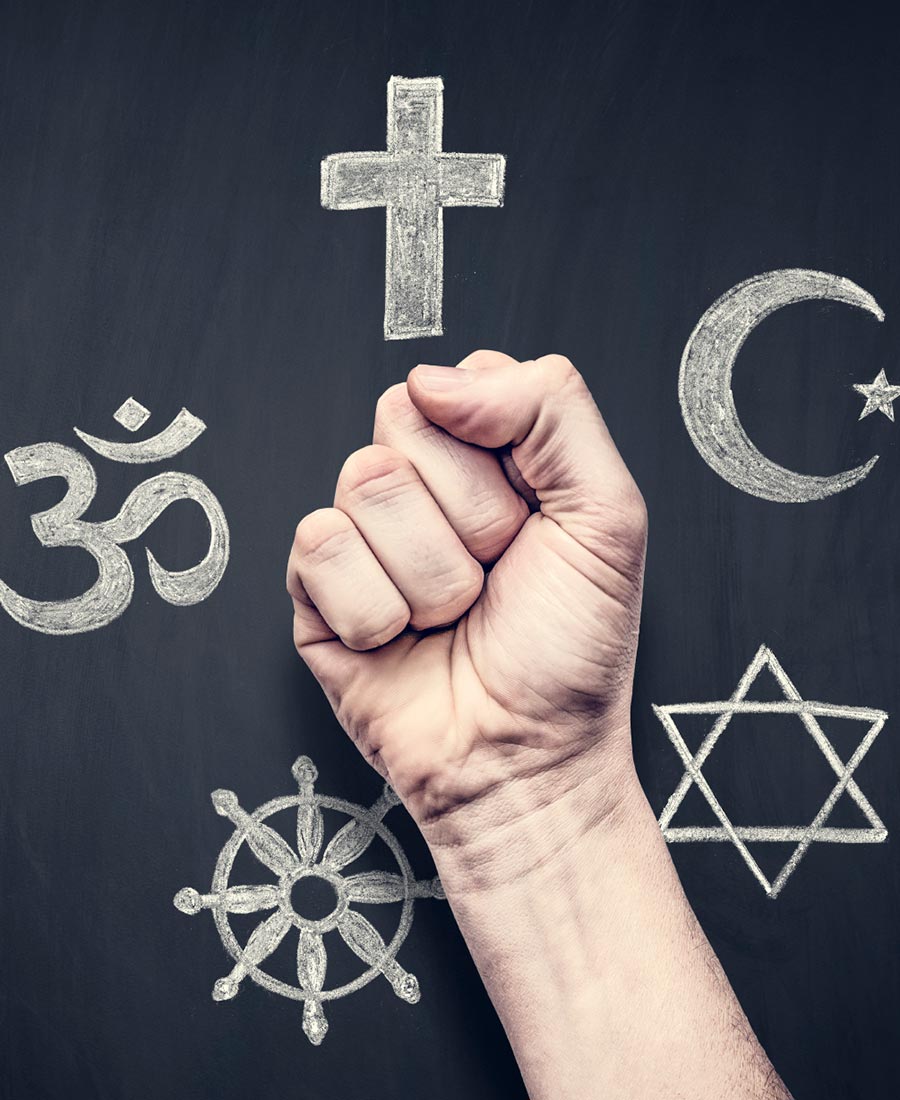 As we reconcile our differing belief systems, setbacks assail us with the daily news of disheartening events around the globe. Grief engulfs us, and we complain about various groups: political parties, ideological groups, professional sectors, genders, and even displaced ethnic groups. We absorb media messages that break our bonded hearts and blur our vision of the goodness of each human soul.
As we reconcile our differing belief systems, setbacks assail us with the daily news of disheartening events around the globe. Grief engulfs us, and we complain about various groups: political parties, ideological groups, professional sectors, genders, and even displaced ethnic groups. We absorb media messages that break our bonded hearts and blur our vision of the goodness of each human soul.
By the time this wintry scene appeared, the New York Times had already freighted the day with an ominous mist of “shuns”—nouns that end in the suffix tion but whose outcomes relate to the homonym shun. These headlines shouted about Immigration Degradation, Refugee Deprivation, Athletic Extortion, Brutality Investigation, Political Character Assassination, and the list went on. Soon enough, an authentic news story seemed to target everyone’s special interest group.
It takes conscious effort to disengage these messages before they turn into cynical biases. Instead, we must look into the eyes of each person as an individual, as well as a positive representative of a diaspora. Even those of us with the best intentions require practice to see only the good, despite this smoke bath swirling in, blanketing the trees until the sun cannot penetrate the veil that masks even the spiritual giants within each stereotyped group.
I looked outside again for inspiration. In the corner of the window, the firelight that smoldered like a hologram suggested the importance of the spiritual messengers who reflect the light of the age, reminding us not to choke on the smoke but to look beyond. In the corner of the room, I thankfully spotted the book Gleanings sitting next to the rocking chair. The previous day, I had read its passages celebrating this thousand-year epoch as “the Divine Springtime” when unity among religions must occur. I had read its reference to “the veils which have blinded the people” to the power of unity and admonished:
Look not upon the creatures of God except with the eye of kindliness and of mercy, for Our loving providence hath pervaded all created things, and Our grace encompassed the earth and the heavens… – Baha’u’llah, Gleanings from the Writings of Baha’u’llah, p. 33.
The book, written in the mid-19th century, teaches the unity of the spiritual messengers, past, present and future, who have come for a common purpose. This book of promises suddenly fell open to another passage:
It is incumbent upon every man, in this Day, to hold fast unto whatsoever will promote the interests, and exalt the station, of all nations and just governments… the doors of love and unity have been unlocked and flung open to the face of men… “Consort with the followers of all religions in a spirit of friendliness and fellowship.” Whatsoever hath led the children of men to shun one another, and hath caused dissensions and divisions amongst them, hath, through the revelation of these words, been nullified and abolished. From the heaven of God’s Will, and for the purpose of ennobling the world of being and of elevating the minds and souls of men, hath been sent down that which is the most effective instrument for the education of the whole human race. – Ibid., p. 94.
What a goal—not to shun but to elevate all minds and souls to ennoble the world of being. If we already strive for such a unity in our interpersonal and intercultural relationships, we must take that next step and call out the good in our public discourse about the legion of benevolent philosophers and icons of change. Perhaps then we can feel the gradual lifting of the mists of distrust.
For me, constantly seeing noble faces rather than stereotypes comes more easily when I spend time seeking the steady brilliance of the sun of truth that beckons like a warm fire–be it in the reflection out the window or in the inspired writings in the book near the rocking chair.
Next: Four Ways to See Beyond Stereotypes


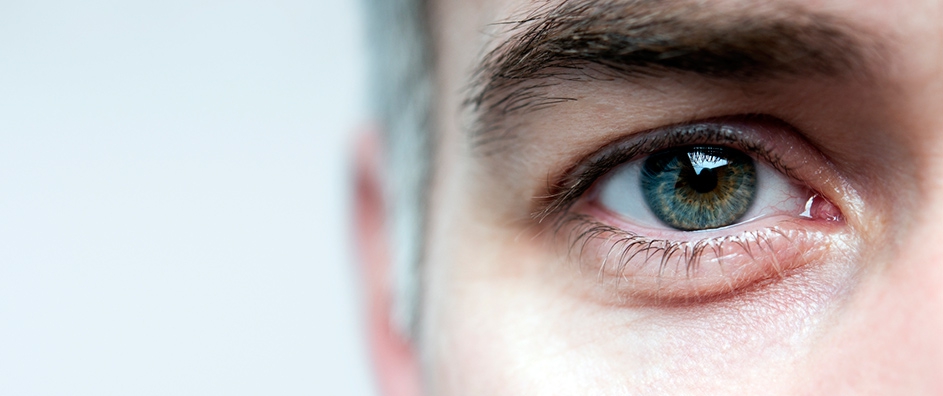
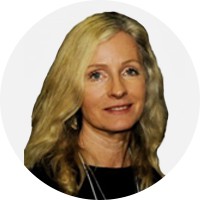
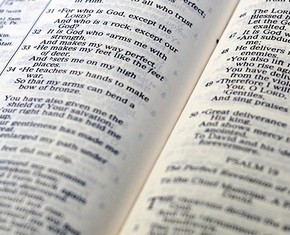

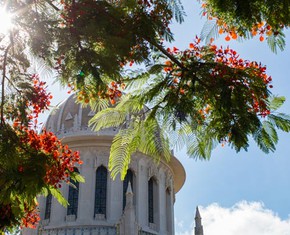









Comments
Sign in or create an account
Continue with Googleor